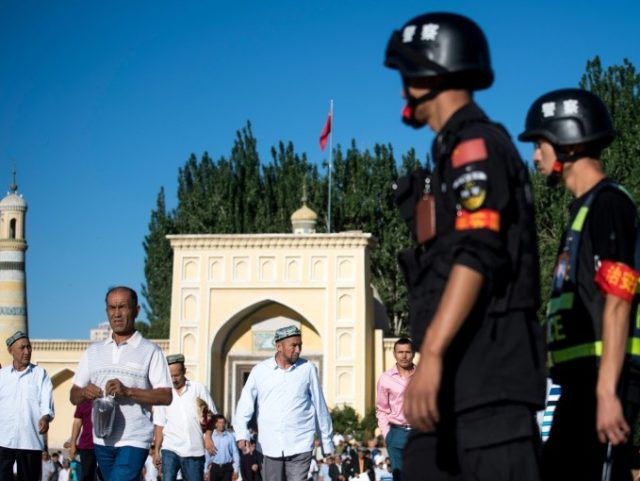China’s state media posted several articles on Monday and Tuesday defending its use of internment camps to force ethnic Uighur Muslims to abandon their language and faith, including an interview with an official in western Xinjiang province who claimed the camps were “vocational education institutions” equipped with basketball courts and hairdressing classes.
China’s Global Times published two articles on Monday defending the use of internment camps to forcibly separate Uighur families, replace the Uighur language with Mandarin, and indoctrinate Uighurs with communist propaganda. Xinjiang is home to the nation’s largest Uighur population and borders much of Muslim Central Asia. It is home to the East Turkestan Islamic Movement (ETIM), an Islamic separatist movement.
Chinese communist authorities claim the existence of ETIM necessitates separating Uighur families and replacing Islam with worship of the Communist Party. In a column referring to the use of internment camps as a “soft landing to peace,” the Global Times attacked human rights groups in the West for condemning their use and defending the rights of the Uighur minority.
“Since the beginning of this year, some Western media and politicians have been viciously attacking actions adopted by Xinjiang to help those affected by extremism to return to their families and society through educational transformation,” the piece claimed. “Radical Western politicians and media have set off a wave of anti-China rhetoric and Xinjiang has become their new target.”
“Those Western forces don’t care about the welfare of the Xinjiang people. They would rather sacrifice stability in Xinjiang and the lives of hundreds of thousands for a single geopolitical victory over China,” the piece continues, calling the camps – believed to house between one and two million people, “fundamentally different” from internment camps.
“Trainees learn the national language, laws and job skills in the institutes. Western forces accuse the authorities of religious persecution,” the Global Times complains.
The West, the piece concludes, is “just messing up the whole thing and creating a narrative against China.”
Xinhua, the main Chinese government news agency, published an interview Tuesday with Xinjiang governor Shohrat Zakir elaborating on what China claims occurs in these “re-education camps.” The interview, presented in Zakir’s own words, presents the image of a mandatory boarding school for anyone considered a threat to commit unspecified crimes. The individuals forced to live there are “suspected of minor criminal offenses that do not warrant criminal punishment.”
There is no indication that police ever prove their guilt before forcing them to undergo “education” at these institutions, nor is their internment described as imprisonment. Instead, Zakir claims that these individuals receive “free vocational training through vocational education institutions to improve their ability in commanding the country’s common language, acquiring legal knowledge and vocational skills, among others.”
Zakir claims the training helps “enhance their understanding of Chinese history, culture, and national conditions” to agree with the point of view of the Communist Party. Zakir also describes the facilities themselves as follows:
Courses on clothing and footwear making, food processing, electronic product assembly, typesetting and printing, hairdressing and e-commerce have been set up to suit local social needs and job market. Multi-skill training is provided to trainees who have the desire and capability to learn, so that they acquire one to two vocational skills upon graduation.
The cafeteria prepares nutritious free diets, and the dormitories are fully equipped with radio, TV, air conditioning, bathroom and shower. Indoor and outdoor sports venues for basketball, volleyball and table tennis have been built, along with reading rooms, computer labs, film screening rooms, as well as performance venues such as small auditoriums and open-air stages.
The interview omits facts that journalists and human rights groups have revealed in interviews with survivors of the camps and guards there. One unnamed guard told Radio Free Asia (RFA) this month, for example, that those undergoing “education” are “under constant surveillance” and have strict rules for where they can hold their hands at any given time. Prior reports have revealed that the cafeterias force Muslims to eat pork and the children of those chosen for the camps are typically taken into orphanages or homes where they are taught Mandarin and raised loyal to the Communist Party. Outside of the camps, the Communist Party has launched a “decisive battle” against certification of halal products and forced Xinjiang stores to sell haram items such as alcohol and cigarettes.
Human rights advocates appear unconvinced of the legality of these internment camps under international law, noting the heavy Communist Party indoctrination evidence suggests goes on in the camps.
“These camps remain blatantly unlawful and arbitrary under both Chinese and international law; and the suffering and abuses of what is estimated to be one million people in them cannot be wiped away through propaganda,” Maya Wang, a senior China researcher at Human Rights Watch, told the South China Morning Post on Tuesday.

COMMENTS
Please let us know if you're having issues with commenting.